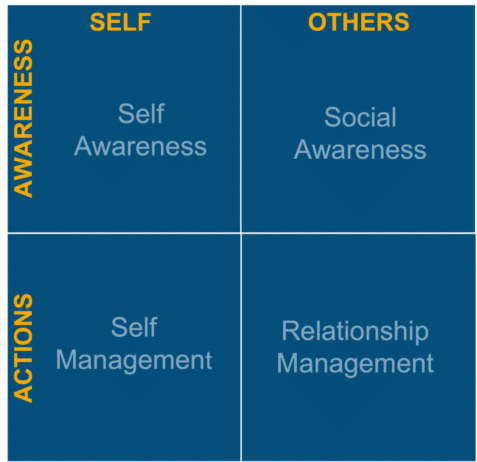More than ever, organizations need leaders who connect with people, not just leaders with the technical skills to fill the role.

The most important factor for team success is cultivating a psychologically safe work environment where everyone feels comfortable showing up as their authentic selves. This means practicing the C-suite skills that matter most to enhance and improve your workplace culture.
So how do we get there? For decades, “soft skills” weren’t considered essential for leaders to climb the ranks. But as we’ve moved through seemingly endless clouds of uncertainty over the past few years, there has been a dramatic shift in perspectives and approaches to work and in the fundamental skills executives need for success.
Leaders and organizations that thrived during the pandemic focused on the human aspects of talent, while organizations that remained more profit-centric struggled. The latter continue to get their bearings as the work paradigm shifts and solidifies.
The thin line that once separated our work life from our personal life has dissolved, and we are settling into the new normal. Below are the skills that matter for leaders in this new era, and these powerful skills are anything but “soft.”
The Top C-Suite Skills Leaders Need
1. Empathy
Topping the list is empathy. Empathy is the ability to engage and acknowledge the feelings and thoughts of those around you. So often in business, we may focus too much on technical skills and knowledge and shy away from competencies like empathy. Or rather than engage in an empathetic interaction, we step in and attempt to “fix” someone so that we feel better about ourselves. However, leaders who practice empathy build stronger, more diverse teams and organizational cultures that value authenticity, connection, and curiosity.
2. Compassion
Though empathy is the number one C-Suite skill, it doesn’t have a true impact without compassion. People with compassion are concerned for others and feel motivated to help them improve.
Compassionate leadership is using your head and your heart to influence, support, and inspire people so that they do the same for others. It raises levels of trust, loyalty, and connection. Leaders who focus on compassion enable others to feel valued, cared for, and respected, empowering them to do their best work.
3. Emotional Intelligence
Coming in third, emotional intelligence (EQ) is a skill that allows you to understand yourself and others better so that you can build deeper connections and strengthen communication. EQ is broken into four parts:
- Self-awareness is taking a mindful pause to notice the emotions you’re feeling and how those emotions impact those around you.
- Self-management is understanding and managing your behavior and reactions to your emotions and environment … particularly regulating responses to strong emotions like anger, embarrassment, frustration, or excitement. And when you react less desirably, own up to it, and apologize.
- Social awareness is understanding those around you and seeing things from their perspective. Social awareness gives you insight into other peoples’ emotions, reactions, and behaviors, acknowledging their inherent strengths.
- Relationship Management is intentionally managing your interactions and relationships to optimize their effectiveness and create an atmosphere of psychological safety in your relationships.
Emotional intelligence is a buildable skill that you can increase through practicing active listening and focusing on others’ perspectives.
4. Optimism
The more we believe success is possible, the more likely we are to be successful. Why is that? Well, it’s because our brains are hardwired to ensure we adopt the behaviors necessary to achieve whatever we believe in. Optimistic leaders have a unique C-Suite skill that begets progress because relentless hope is productive. Optimism is how leaders paint a future vision for others, inspiring people to do what it takes to make that vision a reality.
5. Learning Agility
A crucial leadership skill is learning agility. Learning agility means adapting to first-time, often challenging situations using various behaviors and personal strategies to learn from our experiences and adjust. This skill empowers leaders, teams, and organizations to grow and evolve with a changing climate. Boards seek executives capable of leading their teams through massive change, innovation, succession, and restructuring.
6. Humility
Good leaders are both confident and capable of humility. They recognize that they are only sometimes right and have blind spots like everyone else. As a humble leader, you’re authentic and vulnerable and admit your mistakes and humanness. This kind of leadership cultivates a culture where others feel safe to show up authentically and provide honest feedback. Executives must have excellent self-development and people development skills, which is only possible if you’re willing to learn, grow, and be open to constructive feedback.
In our not-so-distant past, inauthentic leaders were tolerated if they generated good results, even if their leadership created a bad environment. But that has changed. We are privileged to have Boards and executive committees come to us and say, “Bring us someone who won’t run our employees into the ground the way our last executive did.”
Our organizations need leaders who uplift people and heal the workforce. We need executives whose genuineness allows leaders to put away coping habits they employed to do their jobs effectively in a previous environment that lacked psychological safety.
Leadership today is more than checking boxes, monitoring and controlling, and getting results. It’s about understanding and validating the experiences and feelings of others, providing psychological safety, and empowering people to be authentic and innovative—even amidst uncomfortable changes and industry challenges.
These C-Suite skills will give you a competitive advantage in today’s marketplace. Use them on your next executive search or leadership development journey, and your organization will thrive in this new era.

